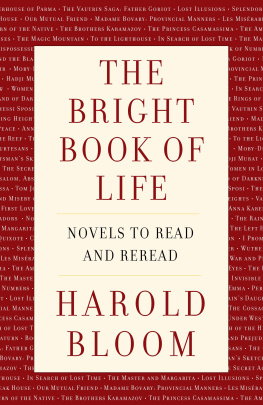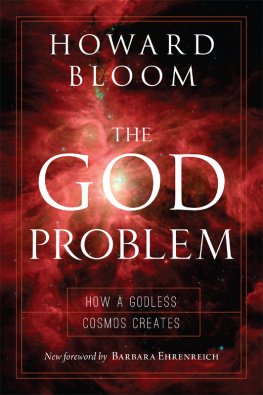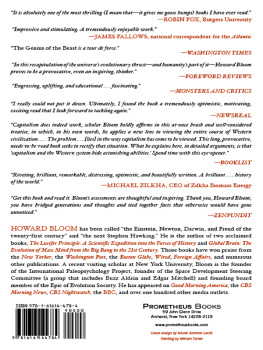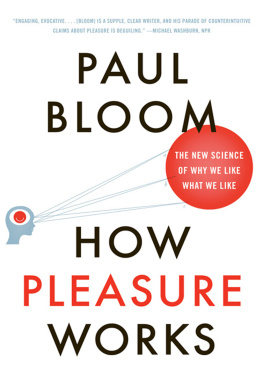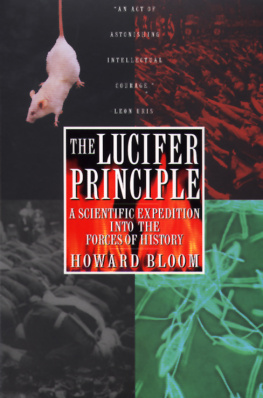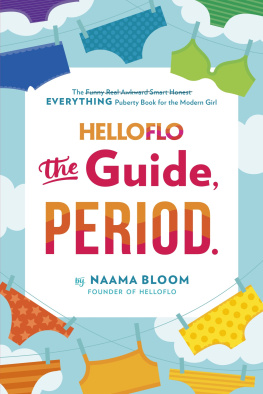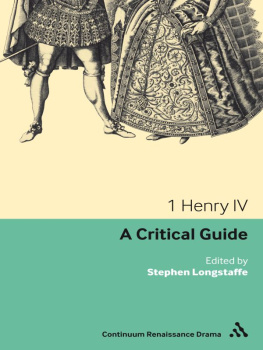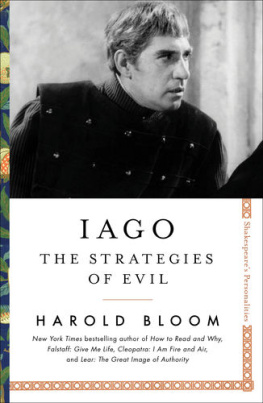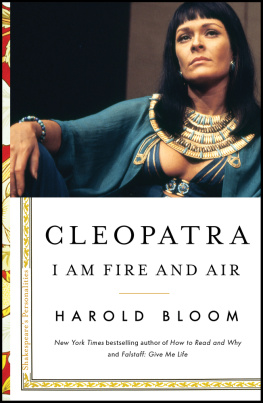Thank you for downloading this Simon & Schuster ebook.
Get a FREE ebook when you join our mailing list. Plus, get updates on new releases, deals, recommended reads, and more from Simon & Schuster. Click below to sign up and see terms and conditions.
CLICK HERE TO SIGN UP
Already a subscriber? Provide your email again so we can register this ebook and send you more of what you like to read. You will continue to receive exclusive offers in your inbox.
Contents
For F. Murray Abraham
Acknowledgments
I would like to acknowledge my research assistant, Alice Kenney, and my editor, Nan Graham. As always I am indebted to my literary agents, Glen Hartley and Lynn Chu. I have a particular debt to Glen Hartley, who first suggested this sequence of five brief books on Shakespeares personalities.
Authors Note
In the main I have followed the latest Arden edition, but have repunctuated according to my understanding of the text. In a few places, I have restored Shakespeares language, where I judge traditional emendations to be mistaken.
CHAPTER 1
Prelude
I fell in love with Sir John Falstaff when I was a boy of twelve, almost seventy-five years ago. A rather plump and melancholy youth, I turned to him out of need, because I was lonely. Finding myself in him liberated me from a debilitating self-consciousness.
He has never abandoned me for three-quarters of a century and I trust will be with me until the end. The true and perfect image of life abides with him: robustly, unforgettably, forever. He exposes what is counterfeit in me and in all others.
If Socrates had been born in Geoffrey Chaucers England and had gone to Eastcheap, a London street, to purchase meat, he might have stopped for ale or sack at the Boars Head Tavern. There he would have encountered Falstaff and traded wit and wisdom with him. I have not the skill to portray that imaginary meeting. Only a fusion of Aristophanes and Samuel Beckett could manage it. Decades ago, sharing Fundador with Anthony Burgess on a Manhattan evening in 1972, I suggested he would be able to venture on the task but he demurred.
A lifelong Falstaffian at eighty-six, I have come to believe that if we are to represent Shakespeare by only one play, it ought to be the complete Henry IV , to which I would add Mistress Quicklys description of the death of Falstaff in act 2, scene 3 of Henry V . I think of this as the Falstaffiad rather than the Henriad, as scholars tend to call it.
Shakespeare never surpassed the alternation between the royal court, the rebels, and Eastcheap in these three plays. The transitions between high and low are so deft they seem invisible.
Is there in all Western literature a portrayal of ambivalence to match Hal/Henry V? In regard to both the King, his father, and to Hotspur, his rival, the Prince is a whirligig of contraries. Toward Falstaff his long gathering ambivalence has turned murderous. Hals imagination is haunted by the wishful image of Sir John Falstaff on the gallows. The wretched Bardolph is hanged by his new King and former companion, in Henry V , without regret. Had Falstaff not departed for Arthurs bosom, Mistress Quicklys poignant mistake for Abrahams bosom, he would have dangled by Bardolphs side.
More than a few scholars of Shakespeare share Hals ambivalence toward Falstaff. This no longer surprises me. They are the undead and Falstaff is the everliving. I wonder that the greatest wit in literature should be chastised for his vices since all of them are perfectly open and cheerfully self-acknowledged. Supreme wit is one of the highest cognitive powers. Falstaff is as intelligent as Hamlet. But Hamlet is deaths ambassador while Falstaff is the embassy of life.
The heroic vitalists in literature include Rabelais Panurge, Chaucers Wife of Bath, and Cervantes Sancho Panza. Falstaff reigns over them. John Ruskin taught that the only wealth is life. Sir John Falstaff, the Socrates of Eastcheap, embodies that truth.
What is the essence of Falstaffianism? My late friend and drinking companion Anthony Burgess told me it was freedom from the state. Anthony and I never quite agreed on that though indeed no societal standards ever could abide Falstaff. I recall telling Burgess that for me the essence of Falstaffianism was: do not moralize . Computing Falstaffs flaws is trivial: he bulges with them. Hal, like his father Bolingbroke, is the essence of hypocrisy. They are Machiavels. Bolingbroke, who becomes Henry IV, is a usurper and a regicide. His nonsensical obsession is that he will expiate the murder of Richard II by leading yet another crusade to capture Jerusalem. He dies indeed in the chamber of his palace called Jerusalem. Hal, when he becomes Henry V, leads a land grab to capture France. A crusade is what one might expect of Prince Hal, who hungers like Hotspur for what both call honor. Falstaff destroys the validity of that appetite in a reply to Hal in act 5, scene 1 in the first part of Henry IV :
Hal: Why, thou owest God a death. [ Exit. ]
Falstaff: Tis not due yet; I would be loath to pay him before his day. What need I be so forward with him that calls not on me? Well, tis no matter; honour pricks me on. Yea, but how if honour prick me off when I come on? how then? Can honour set to a leg? No: or an arm? no: or take away the grief of a wound? no. Honour hath no skill in surgery, then? no. What is honour? a word. What is in that word honour? what is that honour? air. A trim reckoning! Who hath it? he that died o Wednesday. Doth he feel it? no. Doth he hear it? no. Tis insensible, then. Yea, to the dead. But will it not live with the living? no. Why? detraction will not suffer it. Therefore Ill none of it. Honour is a mere scutcheon: and so ends my catechism.
act 5, scene 1, lines 12640
If there could be a religion of vitalism this would do very well for its catechism. Falstaff mocks faith, killing the insane notion that we owe God our death. Knowingly he also mocks both Hal and himself. Disreputable and joyous, he speaks to a world that goes from violence to violence.
Falstaff immediately became the most popular of all Shakespearean personalities, and remains so. The audiences at the Globe and the readers who purchased quartos found little to moralize against in Sir John. His being overflows and that excess brings new meanings to our minds. Exuberance in itself is a shadowy virtue and can be dangerous to the self and to others, but in Falstaff it generates more life.
I am weary of being accused of sentimentalizing Falstaff. I once told a benign interviewer:
Remember, there are three great poets whom neither you nor I would want to have lunch or dinner with, or even a drinkFranois Villon, Christopher Marlowe, and Arthur Rimbaud. At the least they would rob us, at the most they might kill us. Sir John Falstaff wouldnt kill us, but he would certainly gull us one way or another, and perhaps pick our pockets very adeptly.
In that sense the sublime Falstaff is bad news. Against myself I cite Orson Welles, whose Chimes at Midnight remains a neglected masterpiece. Welles made the film, an adaptation of the Henriad, and played it as tragedy. The film had a supporting cast of brilliant stars including Keith Baxter as Hal, John Gielgud as Henry IV, Jeanne Moreau as Doll Tearsheet, Margaret Rutherford as Mistress Quickly, and Ralph Richardson as the Narrator. Welles called Falstaff a gloriously life-affirming good man... defending a forcethe old Englandwhich is going down. What is difficult about Falstaff... is that he is the greatest conception of a good man, the most completely good man, in all drama. His faults are so small and he makes tremendous jokes out of little faults. But his goodness is like bread, like wine.
Next page

